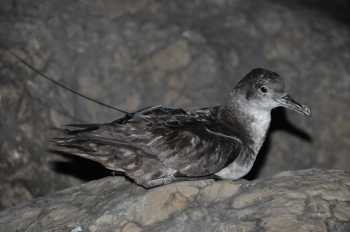IUCN (the World Conservation Union) considered protecting the ACAP-listed Balearic Shearwater Puffinus mauretanicus from a proposed wind farm at its World Conservation Congress held in Jeju, Republic of Korea over 6-15 September 2012. Motion 089 was put to the Congress and adopted following discussion by a contact group. The motion's text follows.
"M089 Protecting the Critically Endangered Balearic Shearwater in the Ebro Delta, Spain
OBSERVING that the Regional Government of Catalonia, Spain, has proposed an experimental offshore wind energy project in the Ebro Delta, and that the Catalan government itself has the power to authorize this;
RECOGNIZING the fundamental role that renewable energies must play in combating climate change;
CONSIDERING, however, that wind projects - like any industrial project - are not without their environmental consequences, particularly the negative impact they have on birds;
CONCERNED that the place chosen for establishing this wind project is an Important Bird Area (IBA), identified for its extreme importance to 11 species of sea bird, 10 of which are listed in Annex I to the European Birds Directive: Balearic Shearwater (Puffinus mauretanicus), Cory's Shearwater (Calonectris diomedea), European Storm Petrel (Hydrobates pelagicus), European Shag (Phalacrocorax aristotelis), Mediterranean Gull (Larus melanocephalus), Slender-billed Gull (Larus genei), Audouin's Gull (Larus audouinii), Sandwich Tern (Sterna sandvicensis), Common Tern (Sterna hirundo) and Little Tern (Sterna albifrons);
FURTHER CONCERNED that the location chosen for the project proposed by the Government of Spain is a Special Protection Area for Birds (SPA) under the European Birds Directive;
ESPECIALLY CONCERNED that the location chosen for this wind project is the main feeding area during the breeding season for more than 50% of the global population and 75% of the wintering population of Balearic Shearwater, a species considered globally Critically Endangered by IUCN;
OBSERVING WITH CONCERN that, in the winter, more than 70% of the Spanish population of Mediterranean Gull is to be found in this location, along with 30% of the breeding population of European Storm Petrel and 20% of the breeding population of Audouin's Gull and Cory's Shearwater;
CONSIDERING that all these species are under threat of extinction according to IUCN criteria;
FURTHER CONSIDERING that the Environmental Impact Assessment has assessed the impact on birds as severe;
OBSERVING that, if the first offshore wind park in Spain were to have a negative impact on these species, this would not only be tragic for the conservation of these species but would also be extremely negative for the future development of offshore wind energy in Spain; and
CONSIDERING that there are other alternative locations on the Spanish coast of less environmental impact where experimental offshore wind energy projects could be conducted;
The World Conservation Congress, at its session in Jeju, Republic of Korea, 6-15 September 2012:
1. REQUESTS that the Government of Catalonia and the Government of Spain do not authorize the Zéfir wind project in the Ebro Delta, given the precautionary principle that must prevail in the presence of species in critical danger of extinction;
2. URGES the governments of Spain, Portugal, France and the United Kingdom not to authorize offshore wind projects in areas often frequented by the Balearic Shearwater, if they fail to respect the obligations of the European Birds and Habitats Directives; and
3. RECOMMENDS that the Spanish authorities seek an alternative location for the Zéfir wind project."
The motion was sponsored by Sociedad Española de Ornitología (SEO/BirdLife) with WWF (Spain), Grupo Ornitológico Balear, Fundación para la Conservación del Quebrantahuesos, Fundación Naturaleza y Hombre and Fundació Caixa Catalunya- Area Territori i Medi Ambient.

Balearic Shearwater carrying a transmitter. Photograph by Henri Weimerskirch
Click here for the official text of the motion and click here to follow a blog on conservation of the Balearic Shearwater.
John Cooper, ACAP Information Officer, 21 October 2012

 Français
Français  English
English  Español
Español